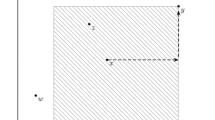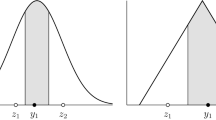Abstract
We consider a model of two-party electoral competition where the parties seek to maximize expected vote shares. The parties form expectations based on possibly different beliefs about the profile of the ideal policies for voters. The model has a Nash equilibrium only under the knife-edge condition that the two parties’ beliefs about the ideal policy for a “random voter” (i.e., a voter who is picked uniformly at random from the electorate) have equal medians; at the equilibrium they choose this median policy as their platforms. Approximate equilibria, defined as pairs of platforms that are almost best responses to each other, may exist even in the absence of a Nash equilibrium. We show that at the approximate equilibria, the parties adopt close platforms, and have opposite “estimates” about the random voter’s ideal policy. We also show that if the policy space has several dimensions, and if the parties’ beliefs are close enough, then typically approximate equilibria do not exist.
Similar content being viewed by others
Notes
Bernhardt et al. (2007) model this situation using a Bayesian game.
Duggan (2006) proves that this is a unique mixed strategy equilibrium.
A result of Duggan (2007) implies that if the parties have a common belief, our model has a mixed strategy equilibrium. In this paper we focus on pure strategies of the parties.
For simplicity, throughout this section, a “median” always refers to a median in all directions.
Banks and Duggan (2006) study a probabilistic voting model that is different from the one studied in this paper. Moreover, they also provide a similar robustness result that allows for mixed strategy equilibria.
Bade (2011) considers a richer class of beliefs than considered in our model. A belief in her model is defined over preference profiles of voters in which a preference is characterized not only by an ideal policy but also by the shapes of indifference curves.
This is similar to Duggan’s (2006) characterization of equilibria in a one-dimensional model where voters’ preferences are not restricted to Euclidean preferences. Clearly, our characterization depends on the assumption of Euclidean preferences.
References
Bade S (2011) Electoral competition with uncertainty averse parties. Games Econ Behav 72:12–29
Banks JS, Duggan J (2006) Probabilistic voting in the spatial model of elections: the theory of office-motivated candidates. In: Austin-Smith D, Duggan J (eds) Social choice and strategic decisions: essays in honor of Jeffrey S Banks. Springer, New York
Bernhardt D, Duggan J, Squintani F (2007) Electoral competition with privately-informed candidates. Games Econ Behav 58:1–29
Calvert R (1985) Robustness of the multidimensional voting model: candidate motivations, uncertainty, and convergence. Am J Polit Sci 29:69–95
Duggan J (2006) A note on the uniqueness of electoral competition when the median voter is unobserved. Econ Lett 92:240–244
Duggan J (2007) Equilibrium existence for zero-sum games and spatial models of elections. Games Econ Behav 60:52–74
Duggan J, Fey M (2005) Electoral competition with policy-motivated candidates. Games Econ Behav 51:490–522
Plott CR (1967) A notion of equilibrium and its possibility under majority rule. Am Econ Rev 57:787–806
Acknowledgments
An earlier version of this paper is part of my PhD dissertation for Hitotsubashi University. I would like to thank Professor Koichi Tadenuma for his guidance, encouragement, helpful comments and suggestions. I would like to thank Professors Akira Okada, Takashi Kunimoto, Shinji Yamashige, and Nozomu Muto for their comments and advice. I would like to thank Yasuhiro Shirata for his suggestion to study approximate equilibria. I would like to thank a referee of the journal for helpful comments and suggestions. Financial support from the Ministry of Education, Culture, Sports, Science and Technology of Japan through the Global Center of Excellence (Global COE) Program is gratefully acknowledged.
Author information
Authors and Affiliations
Corresponding author
Rights and permissions
About this article
Cite this article
Kikuchi, K. Multidimensional political competition with non-common beliefs. Soc Choice Welf 47, 233–244 (2016). https://doi.org/10.1007/s00355-016-0956-1
Received:
Accepted:
Published:
Issue Date:
DOI: https://doi.org/10.1007/s00355-016-0956-1




